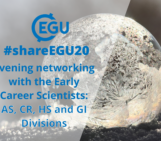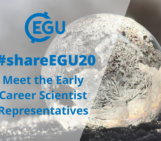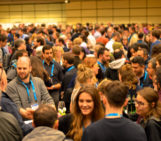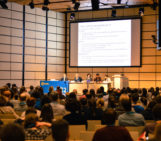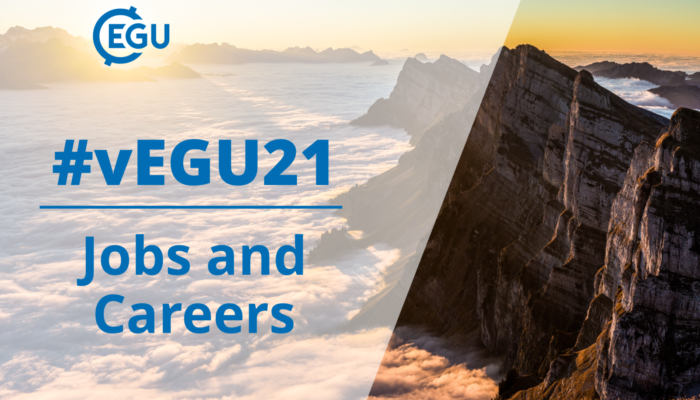
Attending conferences is a great way to widen your network, meet potential future employers and boost your skills. At vEGU21, we are bringing some of the career networking opportunities to you, in the comfort of your own home.
Career development short courses
- Careers inside and outside of academia: a panel discussion. In this panel discussion you will hear from scientists with experience in journalism, science communication, research, engineering and industry. They will share their career paths, provide advice for those interested in changing career, and discuss the pros and cons of life in and out of academia. Wednesday 21st April, 16:00 CEST.
- European Research Council funding opportunities & how to find funding and write a research grant: There are two short courses which focus on career development within academia, specifically surrounding funding. Whilst the first short course (Tuesday 20th April, 14:30 CEST) will focus specifically on European Research Council (ERC) opportunities, the second (Wednesday 21st April, 14:30 CEST) will be more broad, including speakers with experience across different European funding bodies.
- Let’s Peer review & Meet the EGU Editors & Division specific publishing: Reviewing manuscripts is a crucial part of an academic’s work, but how do you get started? Let’s peer review short course (Wednesday 21st April, 09:00 CEST) will cover the best practices for providing constructive, helpful and respectful feedback to others in your field. You can then continue your academic journey and find out how to publish your own work and become an editor in Meet the EGU editors (Thursday 22nd April, 09:00 CEST). There are also a number of division-specific short courses on the publishing process throughout the week. Check the programme to find out more.
Meet the Exhibitors and Experts
vEGU21 has over 50 exhibitors attending the conference, from publishing houses to instrument developers, research institutes to consultancies. On Thursday 29th April at 10:00 CEST you have the opportunity to speak with a number of exhibitors and experts in fields outside of the traditional academic areas. Perhaps you are looking for your next job, or are interested in a change of career? Then join this networking event to discuss career options and hear advice from the experts, in small break-out rooms. There will be the opportunity to move between the experts, so that you can get a true feeling of what job and career possibilities are available.
Meet the Talent: Elevator Pitches
What is an elevator pitch?
Imagine you are in an elevator with a potential future employer, and you really want the job that they’re advertising. You decide to tell the employer why you deserve the job. You are usually only in an elevator (or lift) for a couple of minutes, so you have to be short, concise and cover all the important information. At vEGU21, we want to facilitate the opportunity for job seekers to pitch themselves to potential employers. Therefore, job seekers can post 2-minute elevator pitches, which will be gathered by EGU’s YouTube channel and collected into a special playlist. Employers can then take a look through the videos and request your CV if they are interested in hearing more.
What should I say?
- Tailor your elevator pitch to the job you would like. If you are looking for a science communication role (see Jenny’s example elevator pitch), it is important to state your experience in communicating science to a range of audiences. Perhaps mention events you have organised and state which audiences you have experience with. If you are interested in a data science position, state your interest and capabilities in coding and handling large data. Or if you are interested in editing for a scientific publisher, provide information about your reviewing and editing involvement.
- Start broad and then go more specific. Introduce yourself and your current position/status. Then discuss your interests and experiences. Finish by stating why you want a job or career in a certain direction. If you are coming to the end of a job or studies, you could state that you will be available after a certain time.
- Speak slowly and clearly. You can edit your video if you need, to cut out any pauses or to look back at some notes. Perhaps you could ask your family member or house mate to take the video for you. Try to have a plain background, look into the camera and be yourself. The benefit of not being in a real elevator is that you have time to prepare and make adjustments… oh and there’s no awful muzak.
Who will see these videos?
You need to upload your elevator pitch to YouTube, either using your own personal account or one you have access to and tag it with the hashtag #vEGU21. The elevator pitches will be collected into a dedicated YouTube playlist that will be directly linked into the vEGU21 Virtual Conference Centre. We have over 50 exhibitors attending vEGU21 including engineering firms, scientific journals, journalists, instrument distributors and more, as well as thousands of academics.
My Profile and My Network
Finally, you can tell others that you are in the market for a new job by using the ‘ask me for my CV’ sticker on your profile. You can connect with individual researchers and peers by using the ‘my network’ section on the vEGU21 homepage.

Use your ‘My network’ tool to help you connect to potential collaborators or employers, and use the Virtual Handshake to connect during the two weeks of vEGU21 in the Virtual Conference Centre.
Who knows, you might just end vEGU21 with a new job!



